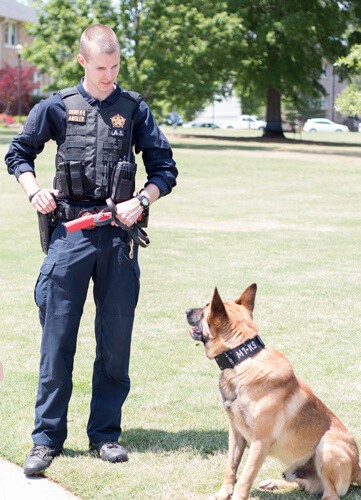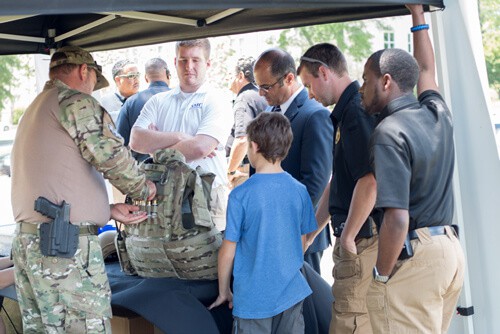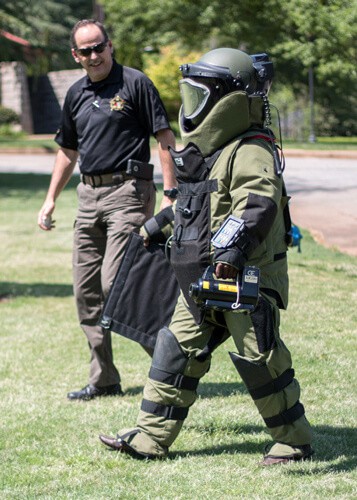Serving Those Who Protect & Serve: SMC’s New Online Criminal Justice Degree will Help Working Adults
by Baker Maultsby and Lisa Mincey Ware

The college plans to offer a new online associate degree in criminal justice that will educate working adults who want to start a career in law enforcement or seek advancement in the profession.
This article appeared originally in the Fall/Winter issue of Frontiers Magazine.
A strong education in criminal justice can make police officers more effective in their work – and that can make communities safer. While police academies offer an introduction to law enforcement issues, they’re understandably focused on getting new recruits safely trained and into the workforce quickly.
To offer law enforcement officers a richer immersion in the topics that affect their jobs and the people they serve, Spartanburg Methodist College (then Spartanburg Junior College) created a Police Science program in 1969. Depending on their needs, students were able to earn an associate of arts degree in police science and administration – after 60 hours of study – or a certificate of attainment granted after 24 hours of police science courses.
The program proved so popular that the college begin a number of other initiatives aimed at serving working adults in the 1970s, including an evening program and a Saturday College for students seeking an early childhood education degree.
More importantly, the Police Science program was successful in improving the quality of local law enforcement. In “Common Ties,” her book about the history of SMC, author Katherine Davis Cann writes that former Director of Spartanburg Public Safety W.C. Bain observed “I was here when the program was started… I can look back and see what we had then and now, and honestly say that there is no comparison in the caliber of men, their training and professionalism. I would have to give educational program 90 percent of the credit.”
The Police Science program continued to grow and, in 1975, became an associate of arts degree in criminal justice program. By 1987, the program further evolved into the associate degree in criminal justice program.
This spring, SMC will take another step forward in criminal justice education while also going back to the roots of the original Police Science program. The college plans to offer a new online associate degree in criminal justice that will educate working adults who want to start a career in law enforcement or seek advancement in the profession.
“We want to make sure everyone understands that this new online degree program will not replace our current traditional classroom-based program,” says Dean of Instruction Mark Gibbs. “These are two programs for students at different stages in their lives and with very different educational needs.” He adds that the new online program is pending approval from the Southern Association of Colleges and Schools, the college’s accreditation organization. If all goes well, the first students will begin taking courses in January 2018.
For working adults, a main benefit of online education is the ability to learn on their own schedule, says Gibbs, who has taught several online courses. A student with a family or without easy access to a brick-and-mortar college can still get the education necessary to start a new career or be more successful in their current field. “Other than the timing of classes and the method of delivery, which will be completely computer-based, the curriculum for the online and traditional programs will be the same” says Gibbs. “Our online students will take two courses every eight weeks, including summers, instead of the traditional four or five courses over 15 weeks every semester.”
If online students stick to the recommended schedule, they will have their degree in two years, Gibbs adds, just like students pursuing the traditional degree.



Representatives from local and regional law enforcement departments and agencies demonstrate K9, swat and bomb detonation work during April’s Law Enforcement Appreciation Day event on SMC’s campus.
The two programs will offer the same courses, such as Victimology, which delves into how victims are affected by violence or other crime as well as how they interact with the criminal justice system. A course in Community Policing explores not only effective ways of responding immediately and effectively to crime, but also proactive initiatives aimed at problem-solving. Other courses in the major, along with general education courses in areas such as government and sociology, give students a broad base of perspectives that will inform their work with both offenders and victims.
There are, of course, important differences for both professors and students between a traditional classroom-based course and online learning. There is interaction – but not in person – and professors must find creative ways to engage students and build relationships.
“We’re planning to incorporate discussion boards and chat rooms to facilitate interaction between students and professors,” says Trey Arrington, SMC’s chief information officer. “Another valuable and engaging learning tool will be video scenarios using actors to illustrate important concepts. These and other tools will be available in a robust and easy-to-navigate course platform that we’re excited to provide to our online students.”
Arrington notes that while SMC has offered online courses to students for several years, this will be the college’s first degree offered completely online. And while it may seem in opposition to the small classrooms and personalized attention SMC is known for, offering the degree this way makes sense.
“The college was created to serve the working professionals of the day,” he says, “So this new program certainly continues the fulfillment of our mission and vision. We’re making it even easier to access.”
Gibbs hopes to see about 40 students enrolled by May. He said SMC’s long history of law enforcement education has led to good relationships with police and sheriff agencies in the area, and he believes working professionals will be drawn both to the opportunity to advance their education in the field and to the flexible class schedule.
“For most students, time management will be key, since many will be juggling work, family and school,” Gibbs remarked. But SMC’s culture is a nurturing one for students, says Gibbs, and he believes it can be thoughtfully extended to the world of online education.
